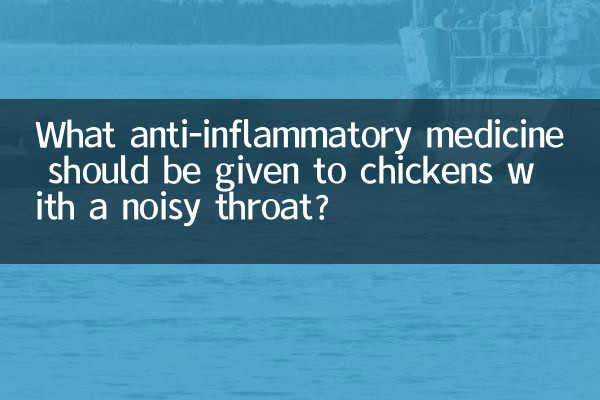What anti-inflammatory medicine should be given to chickens with a noisy throat?
Recently, hot topics in the field of poultry farming have focused on chicken health management, especially the prevention and treatment of respiratory diseases. Many farmers have reported that their chickens have symptoms such as abnormal throat sounds and coughs, and they are in urgent need of scientific medication guidance. This article will combine the hot discussions on the Internet in the past 10 days to sort out the possible causes of chicken throat noise and corresponding recommendations for anti-inflammatory drugs, and provide structured data for reference.
1. Analysis of common causes of ringing throat in chickens

According to discussions among veterinary experts and breeding forums, abnormal throat sounds in chickens may be caused by the following diseases:
| Cause type | Typical symptoms | High season |
|---|---|---|
| infectious bronchitis | Tracheal rales, cough, decreased egg production | Autumn and winter transition period |
| Mycoplasma infection | Persistent cough, swollen eyelids | Available in all seasons |
| Avian influenza (mild) | Shortness of breath, head edema | winter |
| bacterial laryngitis | Throat congestion and increased mucus secretion | summer high temperature period |
2. Recommendation of symptomatic anti-inflammatory drugs
According to the latest "Regulations on the Use of Veterinary Drugs" and practical feedback from farmers, the following treatment options are recommended for different causes:
| Disease name | Recommended medicine | Usage and dosage | Course of treatment |
|---|---|---|---|
| infectious bronchitis | Ribavirin+Amoxicillin | Add 0.1g ribavirin + 0.2g amoxicillin per liter of water | 3-5 days |
| Mycoplasma infection | Tylosin | Add 0.5g per kilogram of feed | 5-7 days |
| bacterial laryngitis | Enrofloxacin | Add 0.05g per liter of water | 3 days |
3. Medication precautions
1.Accurate diagnosis is preferred: It is recommended to first determine the specific pathogen through veterinary testing to avoid blind use of medication.
2.Medication withdrawal period management: Eating poultry must strictly abide by the withdrawal period regulations of different drugs:
| Drug name | Egg withdrawal period | Broiler drug withdrawal period |
|---|---|---|
| amoxicillin | 3 days | 5 days |
| Enrofloxacin | 7 days | 10 days |
| Tylosin | 2 days | 3 days |
3.Adjuvant treatment measures: Combined with vitamin C (0.1g per liter of water), it can enhance the curative effect and keep the chicken house ventilated and dry.
4. Suggestions on preventive measures
1. Regular disinfection: Spray the chicken house with povidone-iodine solution (1:500 dilution) every week.
2. Vaccination: Focus on the immunization procedures for Newcastle disease (first dose at 7 days of age) and spread of the disease (first dose at 14 days of age).
3. Environmental control: Keep the stocking density ≤8 animals/m² and the ammonia concentration <15ppm.
5. Recent expansion of breeding hotspots
1. Alternative antibiotic regimens: The use of probiotic preparations (such as Bacillus subtilis) in the prevention of respiratory diseases has gained attention.
2. The rise of traditional Chinese veterinary drugs: The use of traditional Chinese medicine preparations such as honeysuckle extract and isatis granules increased by 23% year-on-year (data source: 2023 Animal Husbandry Industry Report).
Summary: The treatment of ringing throats in chickens needs to be combined with scientific medication based on specific causes, and at the same time strengthened feeding and management. It is recommended that farmers establish health files to record medication usage and effect feedback, so as to accumulate data support for subsequent disease prevention and control.

check the details

check the details